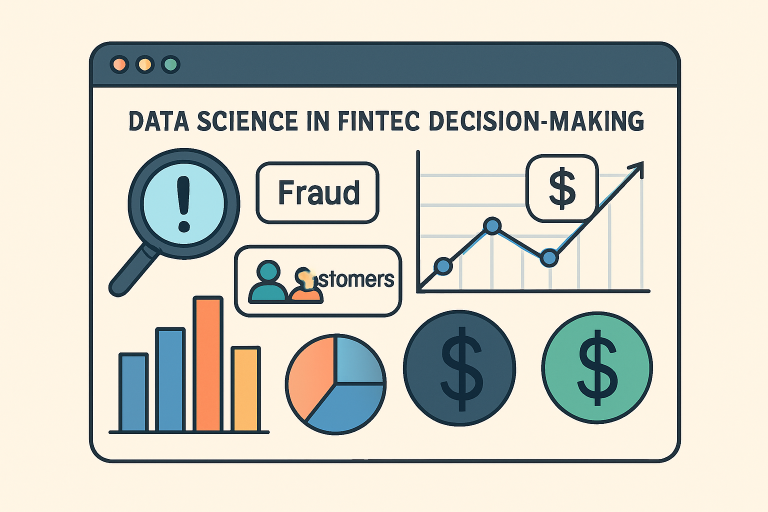Table of Contents
- 1 The Rise of Data-Driven Strategies in Fintech
- 2 Core Applications of Data Science Within Fintech
- 3 Real-Time Analytics: Rapid Responses to Market Changes
- 4 Fintech Innovations Driven by Predictive Modeling
- 5 Balancing Data Security With Business Agility
- 6 The Role of AI and Machine Learning in Fintech Decisions
- 7 Practical Steps Fintech Firms Can Take to Improve Data Literacy
- 8 Conclusion: Shaping the Future of Fintech With Data Science
The Rise of Data-Driven Strategies in Fintech
The financial technology (fintech) sector has witnessed a decisive shift from traditional intuition-based decisions to data-centric strategies, driven by high-velocity data flows, rapid digitization, and the pressure for firms to act with more accuracy and agility than ever before. By harnessing advanced analytics, institutions can mine vast amounts of structured and unstructured data, unlocking actionable insights that were previously unavailable. Decision-makers increasingly rely on predictive tools to optimize lending, insurance, investment, and customer service processes. Data-driven organizations are twenty-three times more likely to acquire customers and six times more likely to retain them compared to less data-savvy counterparts. Experts like David Johnson Cane Bay Partners, note that the strategic adoption of data analytics is essential not only for achieving competitive advantage but also for fostering long-term growth and resilience in the evolving fintech landscape.
The integration of analytics enhances regulatory compliance, reduces operational costs, and personalizes the user experience. Today, over 80% of major financial institutions and startups report active analytics initiatives, highlighting the growing pervasiveness of data science in fintech. As digital transformation accelerates, companies equipped with the skills and tools to interpret, model, and act on data are rewriting the rules of financial services, reshaping how institutions engage with customers and make strategic decisions.
Core Applications of Data Science Within Fintech
At the core of fintech’s data revolution are powerful applications that reshape daily business practices. Key among these are fraud detection and risk management. Using advanced machine learning and pattern recognition, financial systems can spot anomalies instantly, helping to prevent losses from cybercrime and identity theft. Customer segmentation has also gained importance. By examining user data, fintech companies develop highly personalized recommendations—such as targeted loans and investment options—adding value for both customers and the business. Additionally, modern credit scoring models now incorporate nontraditional data sources, enabling lenders to evaluate risk more accurately and fairly. These advancements have significantly improved access to credit, particularly in emerging markets.

Real-Time Analytics: Rapid Responses to Market Changes
Timing is crucial in the financial world, where market trends and consumer needs can shift rapidly, and predictive analytics is playing a transformative role in helping firms respond effectively. Real-time data empowers trading platforms and investment firms to act on the freshest information, leveraging opportunities or protecting assets the moment new insights emerge. Algorithmic trading platforms, for instance, now utilize high-frequency market data to adjust investment strategies in milliseconds. At the same time, predictive models also enhance risk management, credit assessments, and fraud detection, ultimately improving outcomes for both clients and portfolios. As highlighted in a recent FinTech Magazine article, these AI-driven tools are reshaping financial risk management by enabling faster, more accurate, and data-driven decision-making. These capabilities not only help firms stay ahead of market fluctuations but also foster greater trust and confidence among clients. As the financial industry continues to adopt predictive analytics, organizations that effectively leverage these insights are better positioned to drive long-term growth and resilience.
Fintech Innovations Driven by Predictive Modeling
Predictive analytics has become a cornerstone of fintech innovation. Firms now analyze historical data, market activity, and consumer sentiment to anticipate future financial trends. This proactive approach enables the development of responsive products, such as personalized insurance packages and tailored investment portfolios.
Sentiment analysis, which mines market movers’ reactions on social platforms and news sources, provides companies with a powerful tool for gauging the financial market mood and investor sentiment. Meanwhile, predictive modeling assists in regulatory compliance, enabling real-time identification of potential violations and streamlining audit processes. As regulatory demands intensify, predictive analytics ensures firms stay ahead without sacrificing speed or agility.
Balancing Data Security With Business Agility
As fintech organizations handle unprecedented volumes of sensitive financial data, the need for robust security is heightened. Breaches not only incur financial costs but also pose a threat to reputational damage and loss of consumer trust. Companies must navigate a fine line: implementing rigorous data privacy and cybersecurity measures while preserving the innovative, agile culture that underpins fintech’s success. Modern privacy frameworks, including encryption, anonymization, and edge computing, have allowed fintechs to shield customer data even as they scale rapidly.
The Role of AI and Machine Learning in Fintech Decisions
Artificial intelligence has fundamentally transformed the financial decision-making process. Rather than replacing expert judgment, AI augments human intelligence, offering deeper and broader analysis than any individual could achieve alone. Neural networks power everything from automated anomaly detection—flagging suspicious transactions that evade traditional methods—to portfolio optimization, where thousands of variables are balanced in real time.
The future of fintech lies in the synergy between AI systems and skilled professionals. As technology evolves, the collaboration between machine learning, big data, and human intuition will become increasingly seamless, fostering an era of more innovative and reliable financial services.
Practical Steps Fintech Firms Can Take to Improve Data Literacy
For fintechs, the path to data-driven success starts with cultivating internal data literacy. Building cross-functional teams—uniting finance, data science, and IT—ensures holistic skill coverage and minimizes operational silos. Ongoing education, whether through formal training programs or industry certifications, is essential, as the field’s tools and best practices evolve rapidly.
Encouraging a culture that values data-driven decision-making sparks innovation and adaptability at every level.
Conclusion: Shaping the Future of Fintech With Data Science
Data science has fundamentally redefined the way fintech organizations approach strategic decisions. From robust risk management and compliance to bespoke customer solutions and real-time market adaptability, data-driven approaches deliver unprecedented value. As advanced analytics and artificial intelligence continue to mature, the industry anticipates a new wave of breakthroughs that will redefine financial services for years to come.
For fintech leaders and innovators, the ongoing challenge is to foster a culture of agility, creativity, and continuous learning. By embracing the power of data science, firms stand at the forefront of a digital transformation that promises to enhance both performance and trust in global finance.


